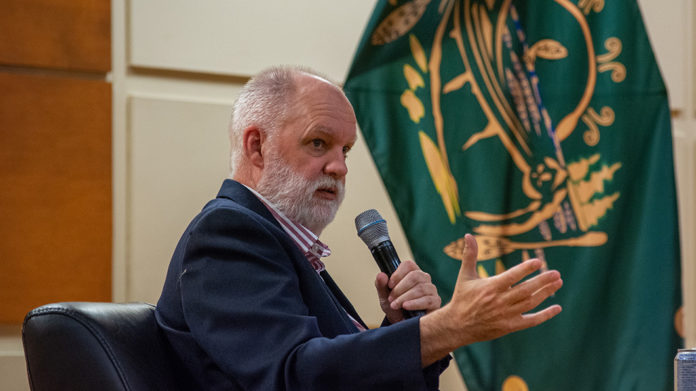After almost 40 years of experience as a health writer at the Globe and Mail, André Picard said Canadian health-care policy “needs to catch up to the people.”
“We don’t have a health-care crisis in Canada, we have an implementation crisis. We have a lack of openness to change,’ said Picard.
Picard delivered the Dalton Camp Lecture in Journalism on Feb. 23 in the Kinsella Auditorium at St. Thomas University. The talk is named after Dalton Camp, a former Canadian politician from New Brunswick who spent time as a political commentator for several media outlets.
During the lecture, which was recorded for broadcast by CBC Radio’s Ideas, Picard spoke to students, faculty, staff and guests about “sticky and messy” health topics like Medicare, Medical Assistance in Dying, HIV/AIDS and abortion.
“I love writing about issues like the right to die because they’re complex,” he said.
“Ultimately, they’re about patients taking control, and patients don’t have enough control.”
He got his start in health journalism during the HIV/AIDS epidemic in the early 1980s, when he was still a university student. He went on to cover other issues like the tainted blood scandal, which caused as many as 30,000 Canadians to die of HIV or Hepatitis C after receiving blood transfusions infected with the viruses.
Picard continues to cover the failures and successes of the Canadian health-care system as a health columnist at the Globe and Mail. He commented on the long wait times in hospitals and such tragedies as sexual assault survivors being sent away from emergency rooms.
“Let’s start by scaling up our successes and stop perpetuating our failures. Every problem we have in Canadian health care is structural and administrative in nature, not a problem of technology, not a problem of medicine and not lack of money. It’s an attitude,” he said.
In an interview with The Aquinian, Picard said if he had to single out anyone as his mentor, it would be Joan Hollobon, who worked as a medical reporter for the Globe and Mail from 1959 until her retirement in 1985.
“Having someone like her as a mentor and someone to look up to — she’s a legend of journalism and especially that she did it as a woman in the 1950s — is quite amazing,” he said.
Corri Maclennan, a first-year student at STU, attended the lecture and asked whether Picard thought history was repeating itself with a rise in transphobia that Maclennan said is similar to homophobic prejudices seen during the HIV/AIDS epidemic.
“Yes,” Picard replied.
“What stood out to me the most was he was very compassionate, he talked about all different eras and issues. I wasn’t expecting that,” said Maclennan.
Picard told students they need to consider how journalists can be agents of social change in the world.
“We need journalists more than ever because they’re honest brokers … and it’s okay to have a heart — in fact it’s essential,” he said.

